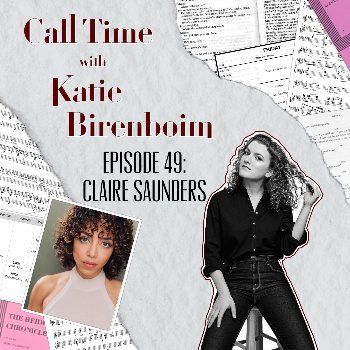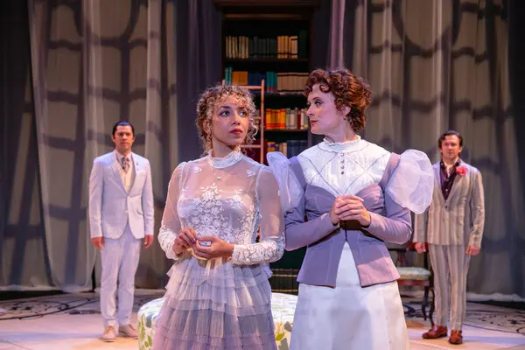
I couldn’t imagine a better second guest to introduce to my new, Arts Journal audience than superstar actor Claire Saunders: not only because she performed in Chains at the Mint Theater (the subject of my last podcast and article), but also because her career is defined by variety.
I first heard of Claire when I saw her — and her twin Alanna! — perform in Barrington Stage Company’s 2016 production of Pirates of Penzance. I then saw her perform in Berkshire Theatre Group’s production of The Skin of Our Teeth, watched her in an episode of Law and Order SVU (a touchstone of my cultural appetite), and even got to help direct her in Elizabeth Baker’s Chains, as discussed above. When I got to know her, I learned that she had also performed in Jocelyn Bioh’s School Girls, or the African Mean Girls Play and Sarah DeLappe’s The Wolves. If you’re looking for a pattern here and finding none — you’ve got the right idea. One of the first things I noticed about Claire, and which became clear when the two of us sat down to discuss her career, is that she can’t be defined by any one thing.
Most actors learn early on — or are to some extent forced to learn early on (more on that perhaps at another time) — that they have a “type.” They are the ingenue, the leading man, the comic relief. They learn their type — in school or by their own observation — and then they stick to it, assisted by managers, agents, casting directors, and more. I’ve never been attracted to the concept of type, which I’ve mentioned on previous podcast episodes, but Claire got to the heart of the matter. “When people try to put me in a box, or define me…” she said, “things don’t go well for them…I like to be onstage as a human, as a person…” in whatever form that may take.
This is particularly compelling given that we are in what Claire calls “the business of being perceived.” Claire and I go deep into that concept, discussing the appropriate ways that the industry can address, or attempt to ameliorate that fact, as well as the toll it can take particularly on young, “malleable” actors. What becomes clear, however, is that Claire has found a way to subvert type and the expectations of the industry in order to forge for herself a unique and variable career in which she is able to approach each and every role as if it is entirely her own, and always has been. This approach and process, which, she says, always starts and ends with the text, allows her to take on wide-ranging roles across genres and mediums, from Queenie in The Wild Party, to Betty Haynes in White Christmas, Cecily in The Importance of Being Earnest, and even a lead in an indie film.

As someone fascinated by older plays and musicals, as discussed last week, I believe that approaches like Claire’s are the only ways to continue producing the canon (or other, less well-known gems, as the Mint Theater does). I also think it’s an approach from which any young actor can learn. While being tied to a type may be praised and emphasized by agents and casting directors galore, holding your own worth, being present in your own space and identity, and developing a strong process is the surest way to achieve your goals. “I have big dreams,” Claire says, “but I hold how I get there lightly.”
Beyond that, Claire and I discover that we both attended Interlochen Arts Camp (at the same time!!) and discuss happiness vs. joy, physical practices like yoga or running, theatre kids becoming cool, Carnegie Mellon, the college audition process, and navigating the industry alongside her siblings, who, together, form the Saunders Collective (and are soon to launch a start-up, of which we get a little sneak preview!). You can listen here or on any preferred podcast platform.


Leave a Reply